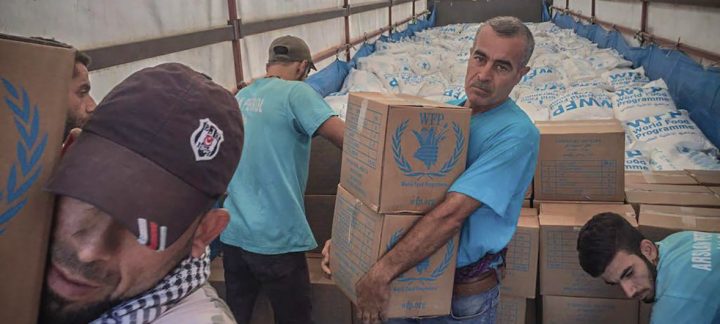The Security Council on Friday evening renewed a UN operation delivering humanitarian aid across the Syrian border to millions of civilians, but some of the body’s members expressed disappointment that the “watered down” measure cut in half the number of crossing points and duration of the authorization.
Failing last month to extend the cross-border authorization after permanent member Russia vetoed one draft resolution and failed to gain enough support for its own rival measure, the Council faced a midnight deadline Friday for the expiration of its six-year-long mandate along with the possibility of yet another “no” vote from Russia.
With 11 votes in favor, 0 against, and with four of its permanent members abstaining – China, Russia, the United States, the United Kingdom – the Council re-authorized only two of the four existing border crossings (Bab al-Salam and Bab al-Hawa in Turkey) for a period of six months (instead of 12), while dropping re-authorization for use of crossings in al-Ramtha (Jordan) and Al Yarubiyah (Iraq).
Negotiating cross-border humanitarian aid
An upsurge in hostilities in north-west Syria, has displaced some 300,000 people since 12 December.
Meanwhile, against the backdrop of new Council members joining the peace and security body in the New Year, negotiations have been ongoing with Permament Members the United States, Russia, China, United Kingdom and France meeting four times since last week, without reaching a compromise.
The main point of contention, according to news reports, has revolved around the Al Yarubiyah crossing.
Resolution sponsors Germany, Belgium and Kuwait have pushed for the continued delivery of aid through two crossing points in Turkey and one in Iraq.
But the competing resolution from Russia, Syria’s closest ally on the Council, advocates the closure of the Al Yarubiyah crossing in Iraq.
The UN cross-border aid delivery mechanism was first established in 2014 through resolution 2165. Its mandate was most recently renewed in resolution 2449 of 2018, to expire in a matter of hours.
Secretary-General António Guterres has stressed that if the authorization is not agreed to on Friday, the UN border operation in Syria will immediately cease.
In that case, a new resolution providing authorization for the mechanism would be needed for it to operate again.
‘An immediate end of aid’
Last Friday, Mark Lowcock, Under-Secretary-General for Humanitarian Affairs, and Rosemary DiCarlo, Under-Secretary-General for Political Affairs, briefed the Council in closed consultations on developments in Idlib.
Without the cross-border operation, we would see an immediate end of aid supporting millions of civilians — UN Humanitarian Coordinator
During the meeting, several members cited the province’s deteriorating humanitarian situation to illustrate the urgent need to renew the cross-border aid mechanism before it expires.
And in November, Mr. Lowcock had told the Chamber that four million people across northern Syria were supported by UN cross-border humanitarian assistance.
“Without the cross-border operation, we would see an immediate end of aid supporting millions of civilians”, he had said.
Unacceptable status quo
Prior to the meeting, Russian Ambassador Vassily Nebenzia expressed his hope that a solution could be found, saying “we are close, but not there yet”.
“I must tell you that all these cries about the imminent catastrophe, disaster which North-East faces if we close one cross-border point are totally irrelevant because humanitarian assistance to that region is coming from within Syria – for a long time, by the way. And it will continue to come”, he stated.
He maintained that as the situation on the ground has changed dramatically, “the status quo is inacceptable”.
“We have to close those cross-border points that are not relevant anymore”, upheld Mr. Nebenzia.










